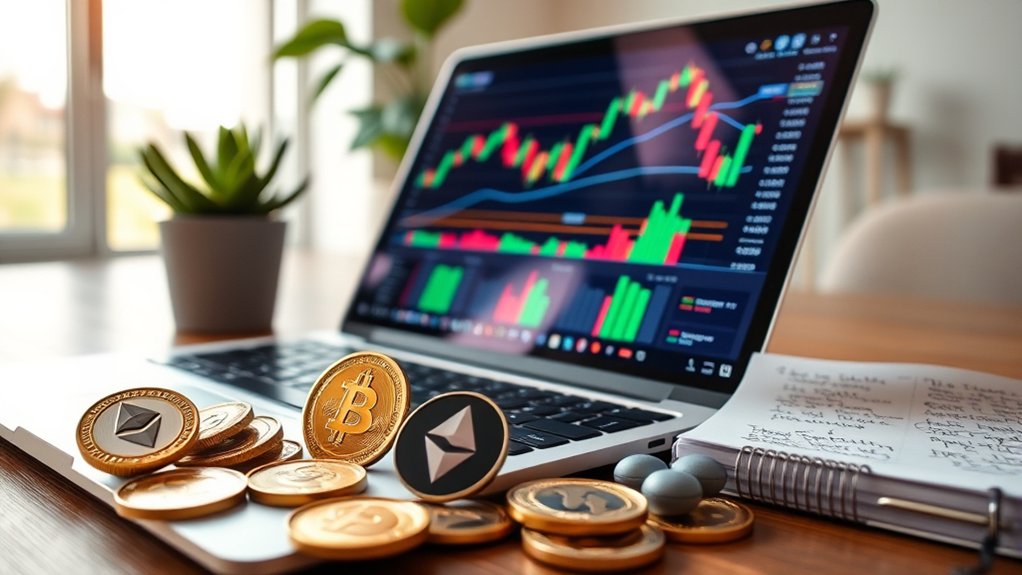Trading cryptocurrency can be a wild ride. First, find a decent exchange—Binance or Coinbase can do the trick. Get your account set up, which feels like booking a dentist appointment. You’ll need to verify your identity. Next, brace yourself for volatility—prices swing, and market sentiment rules. Figure out your risk tolerance, establish a trading plan, and learn the basics of long and short positions. Stick around, and you’ll get the hang of it with a bit more insight.

In the chaotic world of cryptocurrency trading, where fortunes can vanish faster than a Snapchat message, getting started might feel like trying to solve a Rubik’s Cube blindfolded.
First up is choosing the right exchange. Think of it as picking the right sidekick for your superhero journey. You’ve got centralized heavyweights like Binance, Coinbase, or Bybit lining up. Each has its perks and quirks, with Binance being especially well-regarded for its extensive learning resources.
Next, don’t forget the pesky regulatory environment. Local laws and tax implications are lurking in the background, waiting to catch the unsuspecting trader off guard. Ignoring them? A rookie mistake.
After that, it’s time to open an account. This step is like signing up for a gym membership—except instead of getting fit, you might lose your shirt. Identity verification and funding your account are vital. Bank transfers, credit cards—you’ve got options, but they come with their own headaches.
Now, security measures are no joke. Two-factor authentication is your best friend here. Think of it as a double lock on your front door.
With the crypto market’s notorious volatility, your assets can swing wildly. Prices fluctuate based on supply, demand, and market sentiment. It’s a rollercoaster ride that could leave you breathless—if you’re lucky, not broke. Understanding the CAGR of Bitcoin is essential, as it currently hovers around 50-60% per year, highlighting the potential for growth in this asset class. Additionally, a solid grasp of market dynamics will help you navigate these price swings more effectively.
Understanding fundamental concepts is critical. Long positions mean you’re betting the price will rise. Short positions? Well, that’s the opposite and much trickier.
Get familiar with order books—they tell you what’s happening in real time. Technical analysis is your compass in this chaotic sea, helping you spot trends and make informed decisions.
Managing risk is the name of the game. Assess your risk tolerance before diving in. Trading plans? Absolutely necessary. Without them, it’s like sailing without a map—good luck with that!
In the end, crypto trading requires discipline, a bit of luck, and a healthy dose of skepticism.
Frequently Asked Questions
What Is the Best Cryptocurrency for Beginners to Invest In?
When it comes to the best cryptocurrency for newbies, Ethereum often tops the list. Why? It supports smart contracts and dApps—super techy stuff.
Stellar’s low-cost international payments are tempting too. Then there’s Ripple, speeding up banking transactions.
Let’s not forget Tron, which lets creators earn from content. They’re all solid picks, but really, it’s about what fits your style.
Just remember, don’t bet the farm on any one of them.
How Do I Secure My Cryptocurrency Wallet?
Securing a cryptocurrency wallet? It’s like locking your front door but forgetting to close the windows.
Use cold storage for offline safety. Hot wallets? Sure, they’re convenient—until they get hacked.
Strong passwords are a must; weak ones? Just invite trouble. Enable two-factor authentication. Always.
And for the love of crypto, don’t click random links. Bookmark trusted sites.
Protect your seed phrases like they’re the crown jewels. Stay smart, stay safe.
What Are the Tax Implications of Trading Cryptocurrency?
Trading cryptocurrency? Get ready for a tax rollercoaster.
Selling crypto triggers capital gains tax, like a slap in the face. Hold for less than a year? Say hello to ordinary income rates.
Buy a coffee with Bitcoin? Yep, that’s taxable too.
And good luck with record-keeping—it’s crucial. Forget to report your mining income? Surprise! The taxman cometh.
Just remember, ignoring taxes is illegal. So, buckle up and prepare for tax season.
Can I Trade Cryptocurrency Without a Broker?
Sure, you can totally trade cryptocurrency without a broker.
Decentralized exchanges like Uniswap and peer-to-peer platforms like Bisq let users trade directly. No middleman, no fuss. Lower fees? Check. More privacy? Absolutely.
Just grab a non-custodial wallet and plunge into it. But hold up—there’s a catch. Risk management is all on you, buddy. Know your stuff, or you might end up in a world of hurt.
Welcome to the wild west of crypto!
How Do Market Trends Affect Cryptocurrency Prices?
Market trends hit cryptocurrency prices like a freight train. Regulatory uncertainty? Investors panic. Macroeconomic shifts? Prices tumble. Supply and demand? It’s a wild ride, folks.
When tech advances pop up, prices can soar. But let’s face it—volatility is the name of the game. Market sentiment swings like a pendulum, driven by news and events.
Bitcoin leads the pack, dragging altcoins along for the ride. In crypto, expect the unexpected. Buckle up!





